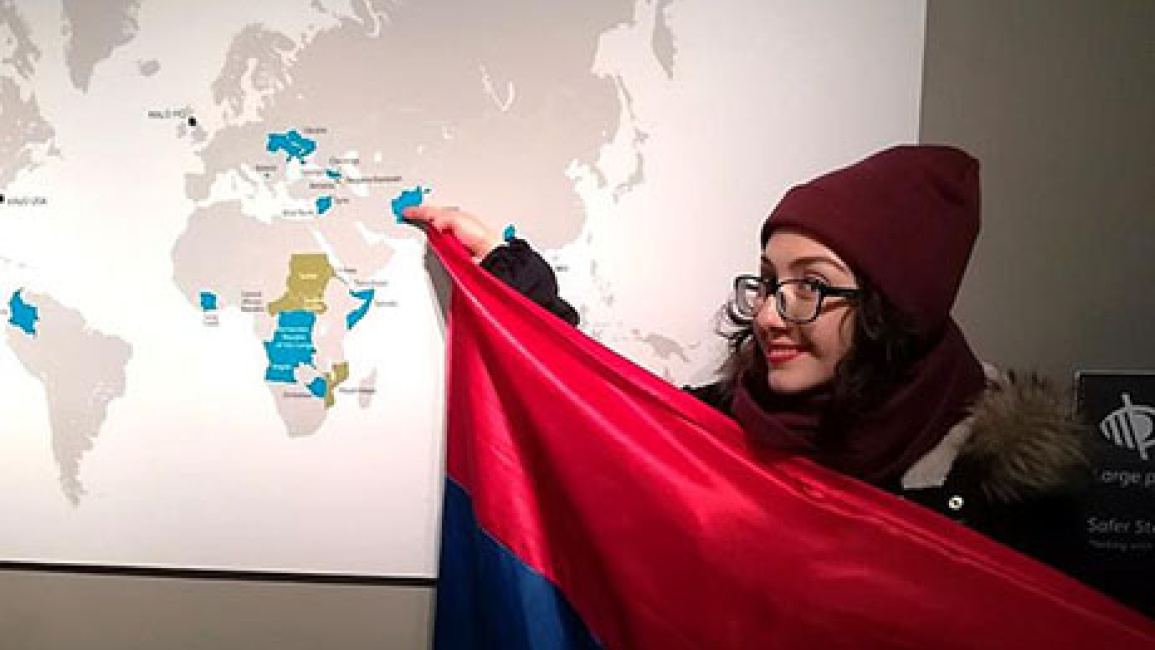- Main
- Node
- “WHEN ELIF SHAFAK KNEW I WAS ARMENIAN, SHE HUGGED ME AND SIGNED MY BOOK “TO LAURA WITH LOVE. SISTERHOOD”: LAURA SIMONYAN
January 15, 2019 | 17:33
“WHEN ELIF SHAFAK KNEW I WAS ARMENIAN, SHE HUGGED ME AND SIGNED MY BOOK “TO LAURA WITH LOVE. SISTERHOOD”: LAURA SIMONYAN
The student of YSU Faculty of Romance-Germanic Faculty, scholar of “Chevening” international scholarship, who got her Master’s program at King's College (London) Laura Simonyan tells about her experience of studying in London, educational system, critical thinking and meeting Elif Shafak.

Perhaps, it’s not so correct to compare our and western educational systems. They are very different and that difference has various objective and subjective reasons.
I can only say that when I arrived in Great Britain my expectations were greater than what I actually saw.
There I understood that education has become a business all over the world. And this problem doesn’t refer solely to us. But the education you get there gives you lots of opportunities for self-expression, and it develops your academic experience.
The resources and materials the university provides to you make you feel wholly student. Libraries are available 24 hours. No book or material you can’t find. I can say that I was sleeping at the library. There was even no need to take your notebook with you. Such factors are very important for each student.
Higher educational establishments and the job market are going side by side in the British educational system. It helped me relate to the educational process with great pleasure. Students have the opportunity not only to gain knowledge but to use that knowledge in practice as well.
It was amazing that during each lesson we had special guests who had important functions in state structures. They shared their skills and knowledge with us. Owing to those discussions I understood that to succeed in state governance it is necessary for specialists to have an academic basis. This way students have the opportunity to discuss how already known theories work in practice, what their advantages and disadvantages are.
With us, this connection seems to be disturbed and doesn’t’ work properly.
Students’ critical thinking is encouraged. I made my research into the UN Security Assembly Resolution 1325 and I have to claim those students were encouraged with high scores who were able to present their themes comprehensively, to analyze the strong and weak aspects.
Numerous and various discussions were a new culture for me. Teachers were the main initiators of those discussions, and specialists were invited to talk about the challenges and fundamental problems existing in that sphere.
In Armenia lecturers are demanding and there –the students. Nobody makes you attend the lectures, not to be absent, to answer the lessons. On the other hand, responsible students are highly appreciated in universities. Students themselves should be interested in the effective and high-quality educational process. This is not only the problem of educational system, it is a problem of thinking, overlook.
When during the meeting with world-famous Professor Amartya Sen I told that in Armenia, in particular at YSU studied his popular “Development as freedom” book he got surprised and didn’t believe that the book was studied as an academic source in Armenia. His theory that freedom is necessary for development and progress in every field was real breakthrough in science.
I can’t say that I knew Elif Shafak’s works very well. I had a friend who was looking for “The Bastard of Istanbul” book in London bookshops. Later, when I started to study the history of the book I learnt that it was special as the case was judged in Turkish court. The book tells about one of the themes prohibited in Turkey-the Armenian Genocide. The author herself noted during the meeting that they judged the book, not her.
I was deeply impressed when at the end of the meeting Elif Shafak knew I was Armenian, she hugged me and signed my book “With love to Laura. Sisterhood”.

